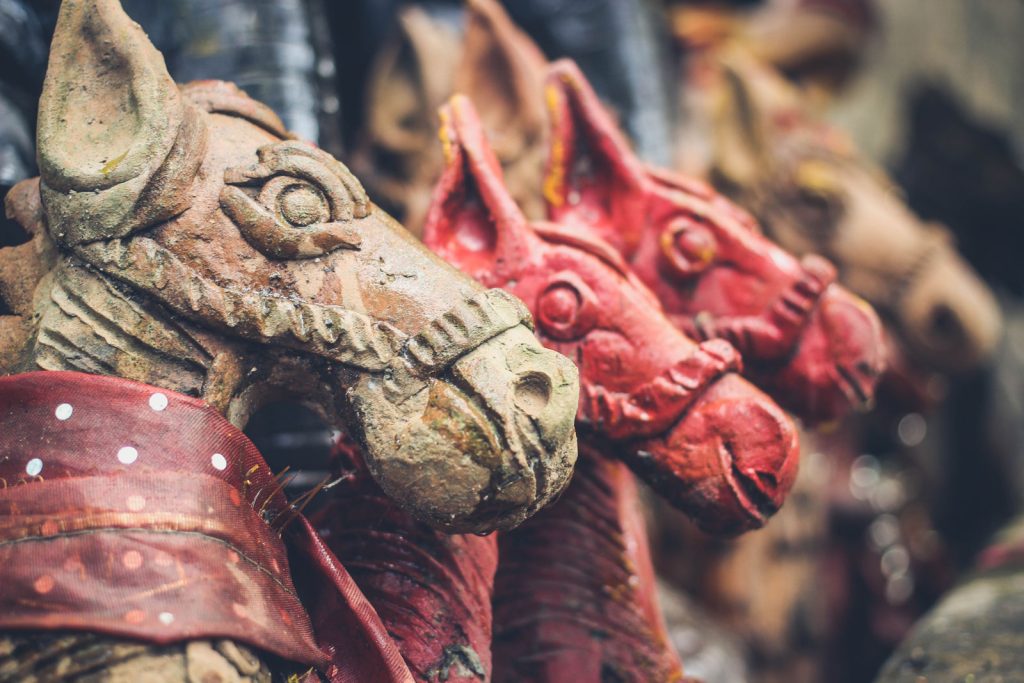Tricycle is offering free access to select articles during this uncertain time.
The following article is adapted from a talk by Buddhist teacher Larry Ward, titled “Contemplating the Apocalypse,” which he delivered as part of the Black Wisdom Online Summit.
I was meditating recently on what we face at this moment in our lives, in our work, and in our practice, and, surprisingly, some images from the New Testament came to my mind. I found the language in the Book of Revelations to be quite illuminating: the apocalypse. The word refers to the end of things, but as we know from our Buddhist practice, the end is always simultaneously the beginning of things.
The Book of Revelations describes the four horsemen of the apocalypse. The first is the white horse, which represents the energy of conquering, controlling, and domination. We currently are living in a world that is contending with the last 500 years of the colonial mind—its expansiveness and its dominion. That kind of mind is not reserved for certain people; it’s in all of us. We can look around the world and see this uncontrollable, unquenchable desire to control, or to have the illusion of control.
But the conquering mind also shows up in our lives individually: in a meeting or in a conversation with a partner or friend where my idea may not be accepted. So it’s important to practice recognizing when our conquering mind is rising, and learn to acknowledge it and not lie about it, to embrace it, to deconstruct it, and to transform it into light.
The second horse of the apocalypse is the red horse, the horse of war—and not just war but also the addiction to war, the inability to understand ourselves without war or to sustain ourselves economically, politically, and culturally without war. Looking again at our societies, our institutions, and ourselves, we can see this pattern of retribution in both the consequences of what has come before and what is happening now.
The third horse is the black horse, and it represents the suffering of plagues, disease, and the inability to sustain life. Starvation, hunger, and homelessness are some of the ways we encounter this on a daily basis. The justifications that we’ve created for ourselves over the last 500 years—and particularly for the poor—is that they will be with us always. Who came up with the idea that the poor are going to be with us always? Whose thought was that? Whose mantra was that?
The fourth horse is the pale horse. It’s the horse of deconstruction, the horse of death and things falling apart. In the Western world, in particular, we’ve not developed a cultural appreciation, respect for, or recognition of death. And maybe this is why our numbness around cruelty and destruction of others does not reach us at deep levels.
Related: Learning to See Our Racial Biases
In my little yard, I have a new rosebush, and I’ve been meditating on it every day. What I’m learning from the rosebush is that it is deconstructing and reconstructing itself at the same time. This is what we must learn how to do in our bodies, minds, communities, institutions, and cultures, all over this planet.
We are in a time of deconstruction. But we also have to remember that every deconstruction is an opportunity for reconstruction. We must ask ourselves, what is it we want to reconstruct and how do we go about it?
Part of what’s important here is to deconstruct our understanding of sustainability, of who gets sustained and how we’re sustained as individuals and as a collective. This is the Earth question, in the largest sense of our consequences. And when I look at White Supremacy, the addiction to racecraft and racism, the dysfunction and confusion around racial suffering, I see it as the same issue as with Mother Earth. For me, these are not separated. We must do two things: We must deal with the immediate crisis in terms of how our power, decision-making, and economic systems are working, and we also must have a long-term vision or strategy.
I’ve begun to work on integrating what we know about trauma and resiliency into mindfulness trainings and practices. Most human beings in the world today, and especially ourselves [black Americans], are carrying generational trauma and generational resilience as well as current trauma and current resilience. This is crucial. That means awakening to consequence, to retribution.
Related: Thich Nhat Hanh: Why We Shouldn’t Be Afraid of Suffering
So I’ve added a fifth horse that’s not in the New Testament. The fifth horse is Maitreya Buddha [the future incarnation of the Buddha on Earth]. Maitreya Buddha is the ground of our reconstruction, and represents a just society at the individual, communal, institutional, and global level. And the four qualities of a just society are embodied lovingkindness, compassion, joy, and equanimity.
By joy, I do not mean only personal joy but also joy with each other. Booker T. Washington had a great quote: “The best way to raise yourself up is to raise somebody else up.” Part of our work is figuring out who to raise up and how to raise up the next generations. And by equanimity, I do not mean accepting anything. In our tradition, equanimity means profound stability, like trees planted by the water that shall not be moved. That’s the fierce equanimity that comes from an open heart, open mind, and a clear direction of our energy toward changing the direct trajectory of history.
We must become more skillful in our meditative and contemplative practice to integrate things that reset, rewire, and enhance our nervous systems, so that we are capable of supporting the healing, transformation, and liberation we want to see and be.
Thank you for subscribing to Tricycle! As a nonprofit, we depend on readers like you to keep Buddhist teachings and practices widely available.

